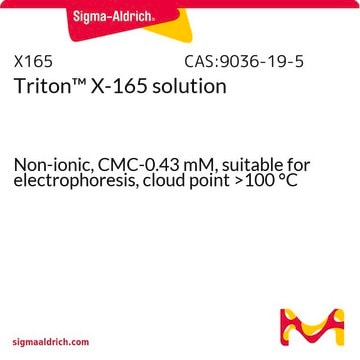Recommended Products
description
non-ionic
Quality Level
mol wt
757 g/mol
CMC
0.33 mM
transition temp
cloud point 88 °C
HLB
14.4
InChI
1S/C18H30O3/c1-17(2,3)14-18(4,5)15-6-8-16(9-7-15)21-13-12-20-11-10-19/h6-9,19H,10-14H2,1-5H3
InChI key
LBCZOTMMGHGTPH-UHFFFAOYSA-N
Application
- Effect of nonionic surfactants on the solubilization of alachlor.: This study explores the use of Triton X-102 in enhancing the solubility of alachlor, a widely used herbicide, demonstrating its potential to improve the environmental behavior and efficacy of agricultural chemicals (Xiarchos & Doulia, 2006).
- Enantioselectivity of structurally modified poly(sodium undecenoyl-L-leucinate) by insertion of Triton X-102 surfactant molecules.: Investigates the modification of chiral separation media with Triton X-102, enhancing enantioselective capabilities in electrophoresis applications, critical for the pharmaceutical industry (Tarus et al., 2004).
- Purification and characterization of human leukotriene C4 synthase.: Demonstrates the use of Triton X-102 in the purification processes of key enzymes involved in inflammatory responses, aiding in the development of anti-inflammatory drugs (Penrose et al., 1992).
- Partial purification and characterization of erythropoietin receptors from erythroid progenitor cells.: Utilizes Triton X-102 to isolate and study erythropoietin receptors, contributing to better understanding and treatment of anemias (Im et al., 1990).
- Isolation and characterization of insulin receptors from rat kidney glomeruli and tubules.: Explores the role of Triton X-102 in isolating specific receptors, enhancing knowledge on kidney function and potential targets for diabetes treatment (Im et al., 1988).
Legal Information
Triton is a trademark of The Dow Chemical Company or an affiliated company of Dow
Signal Word
Danger
Hazard Statements
Precautionary Statements
Hazard Classifications
Acute Tox. 4 Oral - Aquatic Acute 1 - Aquatic Chronic 1 - Eye Dam. 1 - Skin Irrit. 2
Storage Class Code
10 - Combustible liquids
WGK
WGK 3
Flash Point(F)
Not applicable
Flash Point(C)
Not applicable
Personal Protective Equipment
dust mask type N95 (US), Eyeshields, Gloves
Choose from one of the most recent versions:
Already Own This Product?
Find documentation for the products that you have recently purchased in the Document Library.
Customers Also Viewed
Colin E Moore et al.
ChemSusChem, 10(17), 3512-3519 (2017-07-01)
Bimetallic Sn-Pb catalysts with five different Sn/Pb atomic ratios were electrodeposited on Teflonated carbon paper and non-Teflonated carbon cloth using both fluoroborate- and oxide-containing deposition media to produce catalysts for the electrochemical reduction of CO
Pil Seok Chae et al.
Molecular bioSystems, 9(4), 626-629 (2013-02-05)
Membrane protein manipulation is a challenging task owing to limited tertiary and quaternary structural stability once the protein has been removed from a lipid bilayer. Such instability can be overcome by embedding membrane proteins in detergent micelles formed from amphiphiles
Haozhen Ren et al.
Liver international : official journal of the International Association for the Study of the Liver, 33(3), 448-458 (2013-01-11)
Hepatic tissue engineering is considered as a possible alternative to liver transplantation for end-stage liver disease. Several methods of decellularization of xenogeneic liver are available to produce three-dimensional organ scaffolds for engineering liver tissues. However, rare studies have examined and
Hirokazu Yokoyama et al.
Langmuir : the ACS journal of surfaces and colloids, 29(3), 857-860 (2012-12-29)
In this report, we present a novel approach for the elucidation of the physicochemical properties of lipid membranes by isothermal titration calorimetry (ITC) to quantify the heat absorbed during the solubilization of vesicles into TritonX-100 micelles. By using large and
Yonghui Wang et al.
Journal of the science of food and agriculture, 93(13), 3339-3344 (2013-04-19)
The production of pigments by Monascus spp. has attracted increasing attention. Modification of the cell membrane structure by addition of surfactants has proved to be effective for the secretion of intracellular metabolites. Hence in this study the effects and underlying
Our team of scientists has experience in all areas of research including Life Science, Material Science, Chemical Synthesis, Chromatography, Analytical and many others.
Contact Technical Service







